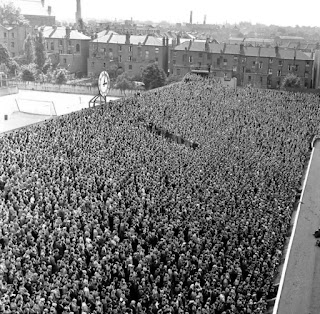RELATED
 |
Tracing the
Evolution of Football: A Story of Adaptation and Growth |
Football is a sport
that has captured the hearts and imaginations of people around the world for
well over a century. From its earliest origins as a rough-and-tumble pastime to
the highly organized and lucrative industry it is today, football has undergone
an incredible transformation, adapting and evolving to meet the changing needs
and desires of fans and players alike. In this article, we'll explore the
evolution of football, tracing its roots and tracing the major changes and
advancements that have shaped the sport as we know it today.
Early Days: Football as a Gentlemen's Game
Football's earliest
ancestors can be traced back to ancient civilizations such as Greece and Rome,
where ball games were played with various levels of formality and rules.
However, it wasn't until the mid-19th century that the modern version of
football began to take shape. In England, public schools and universities began
playing a version of football known as "Association Football." This
game, which would later become known simply as "football," was much
more structured and regulated than previous ball games. It was also primarily
played by the upper classes and was seen as a gentleman's game.
The earliest versions
of football were often characterized by physical roughness and a lack of clear
rules. However, as the sport gained popularity, various governing bodies began
to implement rules and regulations aimed at making the game safer and more orderly.
For example, the Football Association in England was founded in 1863, and its
initial rules included the prohibition of using hands to touch the ball and the
establishment of a standardized playing field. These rules helped to make the
sport more accessible and allowed it to grow in popularity.
Professionalization and the Formation of Leagues
As football gained
popularity, it began to attract more working-class participants, leading to the
formation of the first professional clubs. In 1888, the Football League was
formed, becoming the world's first professional football competition. This was
followed by the creation of the Football Association Challenge Cup (now known
as the FA Cup), which provided amateur teams with the opportunity to compete
against professional teams. The advent of professional football and the
formation of leagues revolutionized the sport, making it more accessible and
paving the way for further growth and development.
The growth of
professional football brought with it a new level of athleticism and skill.
Professional players were able to devote more time to training and practicing,
and the sport as a whole became more sophisticated and exciting to watch. The
formation of leagues also created a more organized .and
structured competition, allowing fans to follow the progress of their favorite
teams and players.
The Growth of Football as a Global Sport
In the decades that
followed, football continued to grow in popularity and spread to new countries.
The first international football match took place in 1872, between Scotland and
England, and by the 20th century, the sport had become a global phenomenon. The
first World Cup, held in 1930, brought together teams from around the world to
compete for the title of world champion. The tournament has since become one of
the most watched sporting events in the world, attracting millions of viewers
and helping to further popularize the sport.
The growth of football
as a global sport was facilitated by advances in transportation and
communication. Teams from different countries were able to travel and compete
against one another, and fans were able to follow the progress of their
favorite teams and players from around the world. The sport's popularity also
helped to bring people from different cultures and backgrounds together,
creating a sense of community and shared passion for the sport.
The Modern Game: Technological Advancements and Increased Commercialization
The advent of
television and the internet has had a profound impact on football, both as a
sport and as an industry. Today, football is a highly commercialized and
lucrative industry, with clubs and players earning vast sums of money from
sponsorships, merchandise sales, and broadcast rights. Additionally, the use of
technology in the sport has grown, with the introduction of video assistant
referees (VAR), goal-line technology, and more advanced data analysis tools
helping to improve the accuracy and fairness of the game.
Conclusion
Football is a sport
that has undergone an incredible transformation over the past century. From its
early origins as a gentleman's game to its current status as a global
phenomenon, football has evolved and adapted to meet the changing needs and
desires of fans and players alike. With technology continuing to play a major
role in the sport, it is likely that football will continue to evolve and
change in exciting new ways in the years to come.






